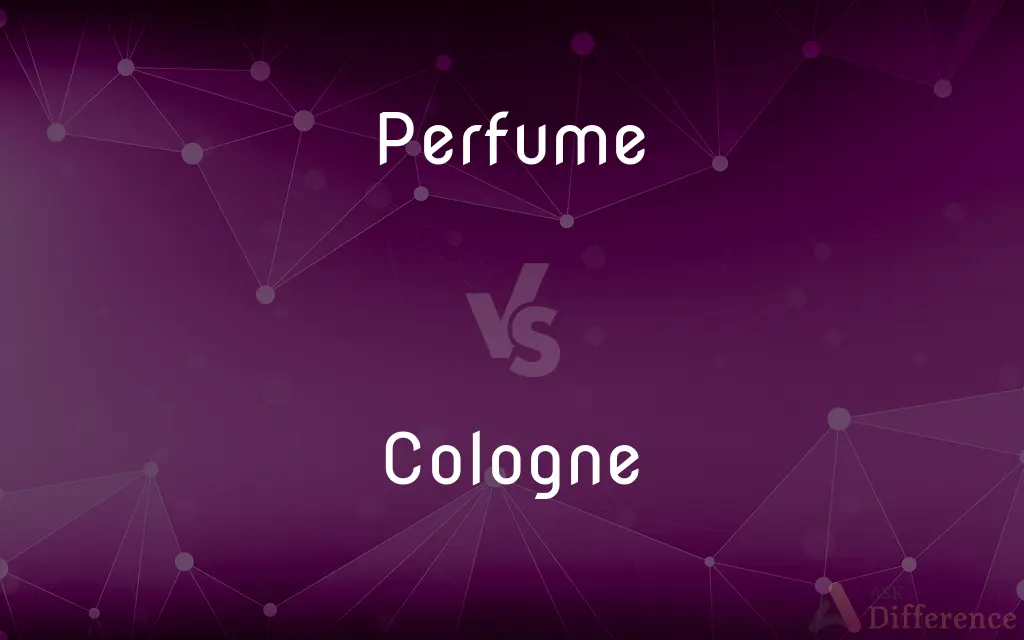Perfume vs. Cologne — What's the Difference?
By Maham Liaqat & Fiza Rafique — Updated on April 1, 2024
Perfume contains a higher concentration of essential oils, offering a longer-lasting scent, whereas cologne, with a lower concentration, is lighter and often preferred for casual wear.

Difference Between Perfume and Cologne
Table of Contents
ADVERTISEMENT
Key Differences
Perfume is renowned for its high concentration of essential oils, ranging between 20% to 30%, which contributes to its long-lasting fragrance. On the other hand, cologne typically contains only 2% to 4% of essential oils, making it much lighter and more suitable for a subtle scent.
Perfume is often associated with luxury and special occasions due to its depth of scent and longevity on the skin. Whereas cologne is considered a good choice for everyday use, providing a refreshing lightness that is not overpowering.
The cost of perfume is generally higher than that of cologne, reflecting the higher concentration of fragrance oils and the complex process involved in its creation. Cologne, with its lower concentration of oils, offers a more affordable option for those seeking a pleasant fragrance.
Perfume is suitable for application on pulse points where the warmth of the body enhances its scent. Cologne, on the other hand, can be applied more liberally due to its lighter nature, often sprayed on clothes and the body.
The variety of scents available in perfumes is vast, allowing individuals to find a unique fragrance that suits their personality and preferences. Cologne, while also available in various scents, tends to focus on fresher, lighter notes such as citrus and herbal tones.
ADVERTISEMENT
Comparison Chart
Essential Oils
20%-30%
2%-4%
Longevity
Long-lasting (several hours to all day)
Shorter duration (a few hours)
Best Used For
Special occasions, luxury wear
Everyday use, casual wear
Application
Pulse points for an intimate scent
Liberally on clothes and body for a light scent
Price
Generally higher due to concentration
More affordable
Scent Variety
Wide, from floral to musky
Focuses on fresher, lighter notes
Compare with Definitions
Perfume
A complex blend of fragrant essential oils and aroma compounds.
She wore her signature perfume to the gala.
Cologne
Applied liberally over clothes and the body.
After his shower, he sprayed cologne generously.
Perfume
Designed for application on the body's pulse points.
He applied perfume to his wrists before the date.
Cologne
Ideal for casual or everyday use due to its subtle scent.
For daily wear, he chooses a citrus-based cologne.
Perfume
Associated with luxury and sophistication.
The perfume came in an ornate bottle, reflecting its high quality.
Cologne
A light form of fragrance with a low concentration of essential oils.
He refreshed himself with a splash of cologne.
Perfume
A liquid fragrance with high essential oil concentration for long-lasting scent.
Her perfume lingered in the room long after she left.
Cologne
Often features fresh, citrus, and herbal notes.
The cologne had a refreshing scent of lemon and rosemary.
Perfume
Offers a wide range of scent profiles, from floral to spicy.
She prefers perfumes with a base of vanilla and jasmine.
Cologne
More affordable and accessible for regular use.
He bought a new bottle of cologne from the local store.
Perfume
Perfume (UK: , US: ; French: parfum) is a mixture of fragrant essential oils or aroma compounds, fixatives and solvents, usually in liquid form, used to give the human body, animals, food, objects, and living-spaces an agreeable scent. The 1939 Nobel Laureate for Chemistry, Leopold Ružička stated in 1945 that "right from the earliest days of scientific chemistry up to the present time perfumes have substantially contributed to the development of organic chemistry as regards methods, systematic classification, and theory."Ancient texts and archaeological excavations show the use of perfumes in some of the earliest human civilizations.
Cologne
Cologne (English: kə-LOHN; German: Köln [kœln] (listen); Kölsch: Kölle [ˈkœlə] (listen)) is the largest city of Germany's most populous state of North Rhine-Westphalia (NRW) and the fourth-most populous city in Germany. With 3.6 million people in the urban region and 1.1 million inhabitants within its city proper, Cologne is the largest city on the river Rhine and also the most populous city of both the Rhine-Ruhr Metropolitan Region and the Rhineland.
Perfume
A fragrant liquid typically made from essential oils extracted from flowers and spices, used to give a pleasant smell to one's body
Musk-based perfumes
I caught a whiff of her fresh lemony perfume
Cologne
A scented liquid made of alcohol and various fragrant oils. Also called eau de cologne.
Perfume
Give a pleasant smell to
Just one bloom of jasmine has the power to perfume a whole room
Cologne
A type of perfume consisting of 2-5% essential oils, 70-90% alcohol and water.
You stink of too much cologne.
Perfume
A substance that emits and diffuses a fragrant odor, especially a volatile liquid distilled from flowers or prepared synthetically.
Cologne
Any of a family of fresh, citrus-based fragrances distilled using extracts from citrus, floral, and woody ingredients, said to have been developed in the early 18th century in Cologne, Germany.
Perfume
A pleasing, agreeable scent or odor.
Cologne
(loosely) A fragrance typically worn by a man as opposed to a woman, regardless of its concentration.
Perfume
To fill or permeate with fragrance; impart a pleasant odor to.
Cologne
A perfumed liquid, composed of alcohol and certain aromatic oils, used in the toilet; - called also cologne water and eau de cologne.
Perfume
A pleasant smell; the scent, odor, or odoriferous particles emitted from a sweet-smelling substance; a pleasant odor
Cologne
A commercial center and river port in western Germany on the Rhine River; flourished during the 15th century as a member of the Hanseatic League
Perfume
(cosmetics) A substance created to provide a pleasant smell or one which emits an agreeable odor.
Cologne
A perfumed liquid made of essential oils and alcohol
Perfume
(transitive) To apply perfume to; to fill or impregnate with a perfume; to scent.
Perfume
To fill or impregnate with a perfume; to scent.
And Carmel's flowery top perfumes the skies.
Perfume
The scent, odor, or odoriferous particles emitted from a sweet-smelling substance; a pleasant odor; fragrance; aroma.
No rich perfumes refresh the fruitful field.
Perfume
A substance that emits an agreeable odor.
And thou shalt make it a perfume.
Perfume
A toiletry that emits and diffuses a fragrant odor
Perfume
A distinctive odor that is pleasant
Perfume
Fill or impregnate with an odor;
Orange blossoms prerfumed the air in the garden
Perfume
Apply perfume to;
She perfumes herself every day
Common Curiosities
Can both men and women use perfume and cologne?
Yes, both men and women can use perfume and cologne, choosing based on personal scent preference rather than gender.
Why is perfume more expensive than cologne?
Perfume is more expensive due to the higher concentration of fragrance oils and the complex manufacturing process.
Is cologne less effective than perfume?
Cologne is not less effective but has a lighter scent and shorter duration due to its lower concentration of essential oils.
What is the main difference between perfume and cologne?
The main difference lies in the concentration of essential oils, with perfume having a much higher concentration than cologne.
Where is cologne typically applied?
Cologne can be applied liberally over clothes and the body for a refreshing scent.
Can cologne be used for special occasions?
Yes, cologne can be used for special occasions, especially if you prefer a lighter, more subtle fragrance.
How should I apply perfume?
Apply perfume to pulse points like wrists, behind ears, and neck for a lasting scent.
Which lasts longer, perfume or cologne?
Perfume lasts longer on the skin than cologne due to its higher concentration of essential oils.
Are there for both genders perfumes and colognes?
Yes, there are many both genders options available that cater to a wide range of scent preferences.
How do I choose between perfume and cologne?
Choose based on the occasion, scent preference, and desired longevity of the fragrance.
How can I make my cologne last longer?
To extend the scent of cologne, apply it after moisturizing the skin and spray on warmer areas of the body.
Why do perfumes smell different on different people?
Perfumes react with the skin's natural oils, which can vary from person to person, affecting the fragrance's final scent.
Is it okay to wear perfume daily?
While perfume can be worn daily, its rich scent and higher cost often make it a choice for special events.
Can perfume and cologne go bad?
Yes, both can deteriorate over time, especially if exposed to heat and light.
Is it better to spray perfume on clothes or skin?
It's recommended to spray perfume on the skin, particularly on pulse points, for a more intimate and lasting fragrance.
Share Your Discovery

Previous Comparison
Impel vs. Propel
Next Comparison
Canter vs. TrotAuthor Spotlight
Written by
Maham LiaqatCo-written by
Fiza RafiqueFiza Rafique is a skilled content writer at AskDifference.com, where she meticulously refines and enhances written pieces. Drawing from her vast editorial expertise, Fiza ensures clarity, accuracy, and precision in every article. Passionate about language, she continually seeks to elevate the quality of content for readers worldwide.














































